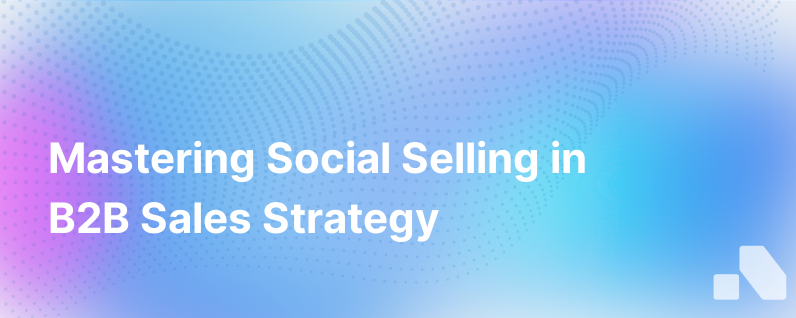Social Selling For B2B Sales
Published on December 28, 2023 by David Zhang
Social selling has emerged as one of the most influential trends in the contemporary sales landscape, particularly within the B2B sector. In essence, social selling is the practice of leveraging social media platforms to connect with prospects, build relationships, and ultimately, drive sales. In today's ultra-connected world, where traditional sales tactics are losing their sheen, social selling stands out as a beacon of modernity, enabling sales professionals to harness the power of digital networking to their advantage.
In this in-depth guide, we will explore the nuances of social selling for B2B sales, providing insights into its strategic application to foster better connections and drive revenue.
Understanding Social Selling
At its core, social selling for B2B isn't about bombarding potential clients with unsolicited DMs or peppering them with promotional content. It is a sophisticated and subtle art that requires strategy, patience, and authenticity. It involves using social media to listen, understand, and engage with prospects on platforms they frequent — LinkedIn, Twitter, Facebook, and increasingly, Instagram.
The essence of social selling is to provide value to potential customers by sharing insightful content, commenting on trends, answering questions, and contributing to conversations – all while establishing the seller as a trusted thought leader in their respective domain.
The Strategic Approach to Social Selling
Unlike B2C interactions, which can be more transactional, B2B relationships are built over time through trust, expertise, and credibility. Social selling in the B2B space is more about relationship-building and less about immediate conversions.
Here is a four-pillar strategy to incorporate social selling effectively into your B2B sales process:
1. Optimize Online Presence
The journey begins with a sparkling professional online presence. Everything — your LinkedIn profile, Twitter bio, or other professional network identities — should be curated to portray you not just as a salesperson, but as a thought leader in your industry. This includes a professional headshot, a compelling bio, detailed work experience, and evidence of your expertise (such as articles, certifications, and endorsements).
2. Provide Value Through Content
Content is the currency of social selling. By sharing and creating content that is valuable, relevant, and insightful, you mark yourself as an industry expert. This could include blog posts, industry reports, infographics, or webinars. The goal here is to establish a reputation of authority within your domain, leading prospects to turn to you for guidance and solutions.
3. Engage Authentically
Engagement is what fuels the social selling engine. It's where the ‘social’ in social selling comes alive. This involves liking, commenting on, and sharing your prospects’ and customers’ content, as well as responding promptly and meaningfully to comments on your own content. Rather than pushing a sales agenda from the outset, this step focuses on building a rapport and engaging in genuine, human-to-human interactions.
4. Build and Nurture Relationships
By now, prospects should view you as a trusted source of knowledge. This is where relationship-building kicks into high gear. Connect with potential clients, engage in one-on-one conversations, and when the time is right, seamlessly transition these interactions into business discussions.
As an expert in your field, leverage the information provided through social channels to understand the needs of your prospects better. Tailor conversations to their business pain points, leveraging the credibility you've established through your content and engagements.
The Benefits of Social Selling for B2B Sales
Social selling offers several inherent advantages for B2B sales professionals, which include but are not limited to:
Extended Reach: Social media platforms give salespeople access to thousands, if not millions, of potential customers, influencers, and decision-makers. Cost-Effective Lead Generation: Compared to traditional methods, social selling is a cost-effective strategy for generating and nurturing leads. Shorter Sales Cycles: By building relationships and credibility in advance, the sales process is often shorter and more fluid. Increased Sales Performance: Sales professionals who master social selling are shown to outperform their peers who don’t. Deep Customer Insights: Social media platforms provide valuable insights into prospect behavior, preferences, and needs.
Measuring Social Selling Success
Implementing a social selling strategy isn’t an end in itself. Measuring effectiveness is key to understanding the impact. Key performance indicators (KPIs) for social selling might include the number of meaningful connections made, the quality and quantity of engagements, the amount of high-value content shared, and the number of leads generated through social channels.
Platforms like LinkedIn offer their own metrics, such as the Social Selling Index (SSI), which gauges how successful an individual is at establishing their professional brand, finding the right people, engaging with insights, and building strong relationships.
Embracing the Digital Revolution
The digital revolution has made it abundantly clear that B2B sales will never be the same. Buyers are well-informed, more connected, and expect personalized, consultative interactions. Social selling, when done correctly, fits precisely into this new era, allowing sellers to meet buyers where they are, engage them on their terms, and build relationships that drive sales.
In conclusion, social selling is a potent tool in the modern B2B sales toolkit. It takes the timeless principles of relationship-building and trust and adapts them to the scale and pace of the digital age. By crafting a strategy that includes a robust online presence, engaging content, authentic interactions, and persistent relationship nurturing, B2B sales professionals can leverage social platforms to not just meet, but exceed their sales goals.
Always remember that behind every profile, tweet, or post is a person, and the key to unlocking social selling success is to focus on creating genuine human connections.